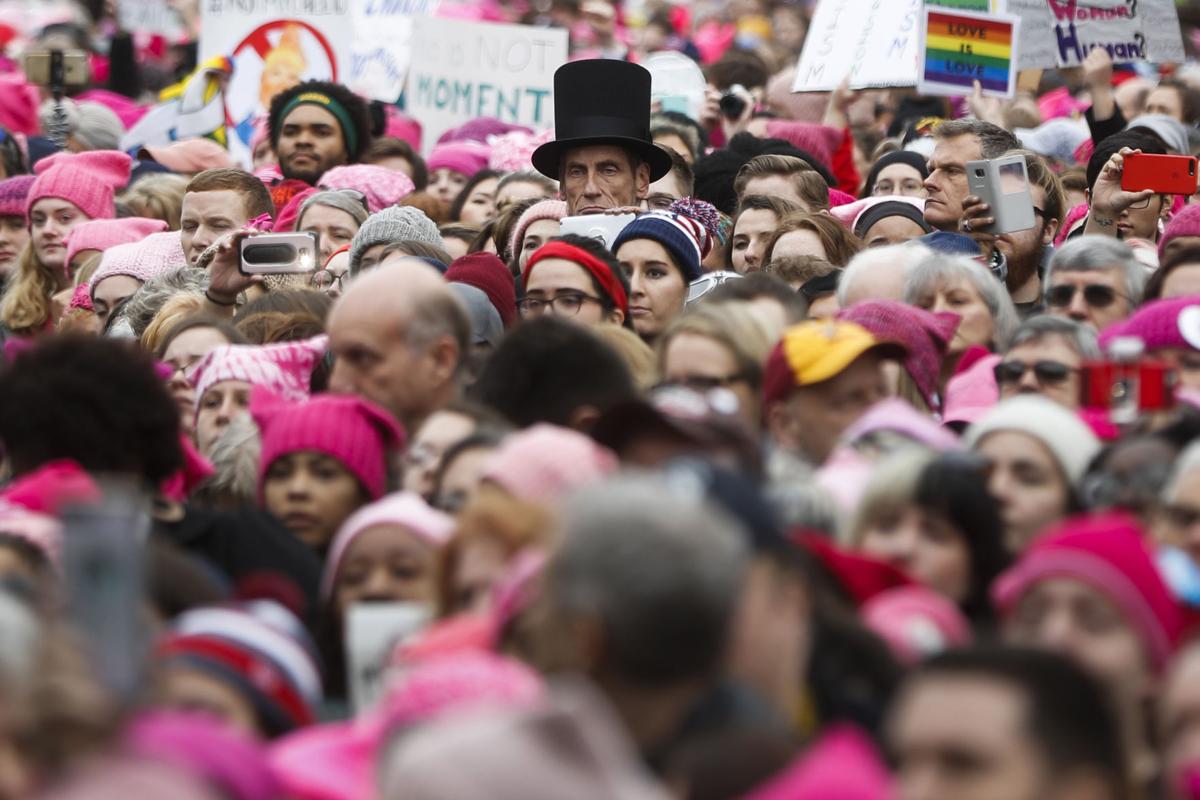WASHINGTON (AP) — Wearing pink, pointy-eared "pussyhats" to mock the new president, hundreds of thousands of women massed in the nation's capital and cities around the globe Saturday to send Donald Trump an emphatic message that they won't let his agenda go unchallenged over the next four years.
The massive turnout has forced a change of plans. With the entire planned route filled with hundreds of thousands of protesters, organizers can't lead a formal march toward the White House.
That's according to a District of Columbia official, speaking on condition of anonymity because the official isn't authorized to speak for the march.
The official says that shortly before 1 p.m., people were standing along the entire march route.
While there will be no formal march led from the protest stage near the Capitol, the crowd is still expected to move toward the Ellipse, an area of the National Mall in front of the White House.
The official says there could be more than half a million people on the Mall, but it's difficult to estimate because low cloud cover is making aerial photographs impossible.
"We march today for the moral core of this nation, against which our new president is waging a war," actress America Ferrera told the Washington crowd. "Our dignity, our character, our rights have all been under attack and a platform of hate and division assumed power yesterday. But the president is not America. ... We are America and we are here to stay."
The women brandished signs with messages such as "Women won't back down" and "Less fear more love" and decried Trump's stand on such issues as abortion, health care, gay rights, diversity and climate change. Their message reverberated at demonstrations around the world, from New York, Philadelphia and Chicago to Paris, Berlin, London, Prague, Sydney and beyond.
Boston professor Garland Waller, 66, part of the Washington mobilization, said she was "devastated" after the election and had to take action. "I don't know what to do to make a difference anymore, and this feels like a first step," she said.
Saskia Coenen Snyder, a teacher at the University of South Carolina who came to a rally in Columbia, said: "I'm not sure we could have picked a more irresponsible, misogynistic and dangerous man to be president."
There were signs that the crowds in Washington could top those that turned out for Trump's inauguration on Friday. City officials said organizers of the Women's March on Washington more than doubled their original turnout estimate to 500,000.
More than 600 "sister marches" were planned around the world, and plenty of men were part of the tableau, too. Organizers estimated 3 million people would march worldwide. In Chicago, organizers canceled the march portion of their event for safety reasons after an overflow crowd estimated at 150,000 turned out.
Seventy-one-year-old Allan Parachini, who traveled from Hawaii to the Washington march, called it "the most impressive crowd I've seen since Woodstock."
Retired teacher Linda Lastella, 69, who came to Washington from Metuchen, New Jersey, said she had never marched before but felt the need to speak out when "many nations are experiencing this same kind of pullback and hateful, hateful attitudes."
"It just seemed like we needed to make a very firm stand of where we were," she said.
As demonstrators rallied alongside the National Mall, Trump opened his first full day as president by attending a prayer service at the Washington National Cathedral, a tradition for the day after inauguration. The crowd planned to head his way after hours of speakers and music, with a march toward the grassy Ellipse behind the White House.
On Trump's way back to the White House, his motorcade passed several groups of protesters that he would have been hard-pressed to miss.
On the streets, feminist leader Gloria Steinem described the worldwide mobilization as "the upside of the downside: This is an outpouring of energy and democracy like I have never seen in my very long life."
"Sometimes we must put our bodies where our beliefs are," she told the crowd, labeling Trump an "impossible president."
Hillary Clinton, who lost to Trump, took to Twitter to thank the participants for "standing, speaking and marching for our values."
The marches displayed a level of enthusiasm that Clinton herself was largely unable to generate during her campaign against Trump, when she won the popular vote but he outdistanced her in the electoral vote.
At rallies around the world, many participants wore hand-knit "pussyhats" — a message of female empowerment aimed squarely at Trump's crude boast about grabbing women's genitals.
They "ain't for grabbing," actress Ashley Judd told the Washington crowd.
The marches were a magnet for A-list celebrities, unlike Trump's inauguration, which had a deficit of top performers.
Cher, in the nation's capital, said Trump's ascendance has people "more frightened maybe than they're ever been." In Park City, Utah, it was Charlize Theron leading demonstrators in a chant of "Love, not hate, makes America great." In New York, actresses Helen Mirren and Cynthia Nixon and Whoopi Goldberg joined a crowd of protesters marching to Trump's local home.
In Paris, thousands rallied in the Eiffel Tower neighborhood in a joyful atmosphere, singing and carrying posters reading "We have our eyes on you Mr. Trump" and "With our sisters in Washington." Hundreds gathered in Prague's Wenceslas Square in freezing weather, mockingly waving portraits of Trump and Russia's Vladimir Putin.
"We are worried about the way some politicians talk, especially during the American elections," said organizer Johanna Nejedlova.
In Sydney, thousands of Australians gathered in solidarity in Hyde Park. One organizer said hatred, bigotry and racism are not only America's problems.
The rallies were a peaceful counterpoint to the window-smashing unrest that unfolded on Friday when self-described anarchists tried to disrupt the inauguration. Police used pepper spray and stun grenades against demonstrators. More than 200 people were arrested.





